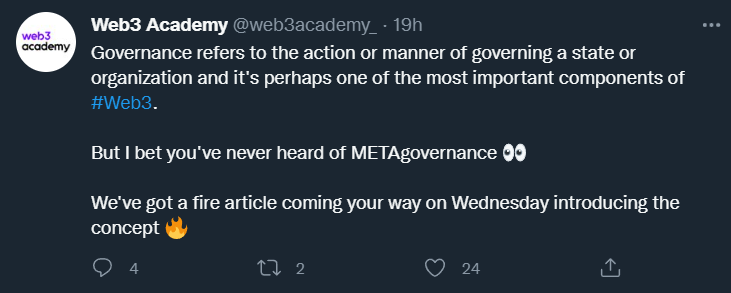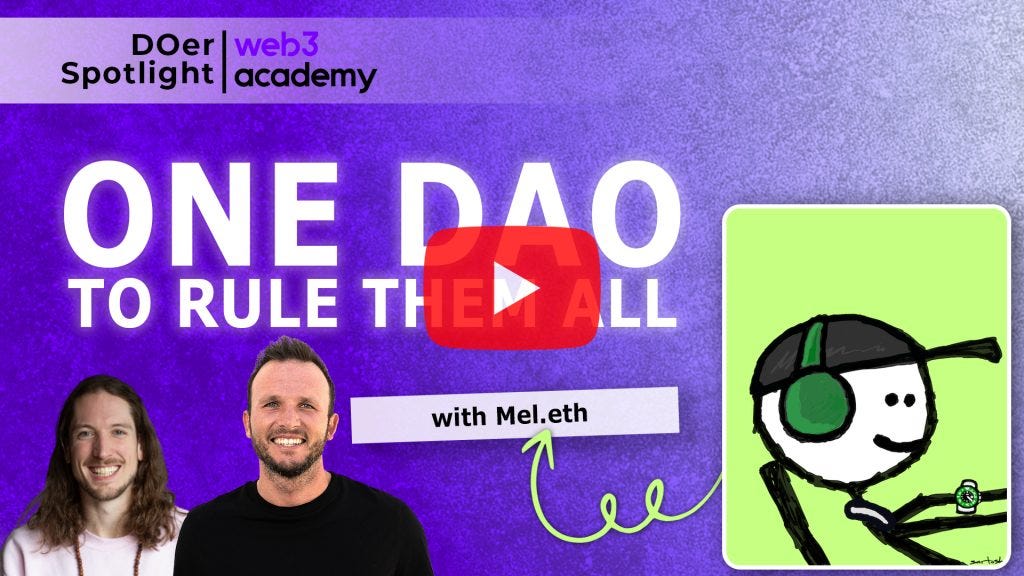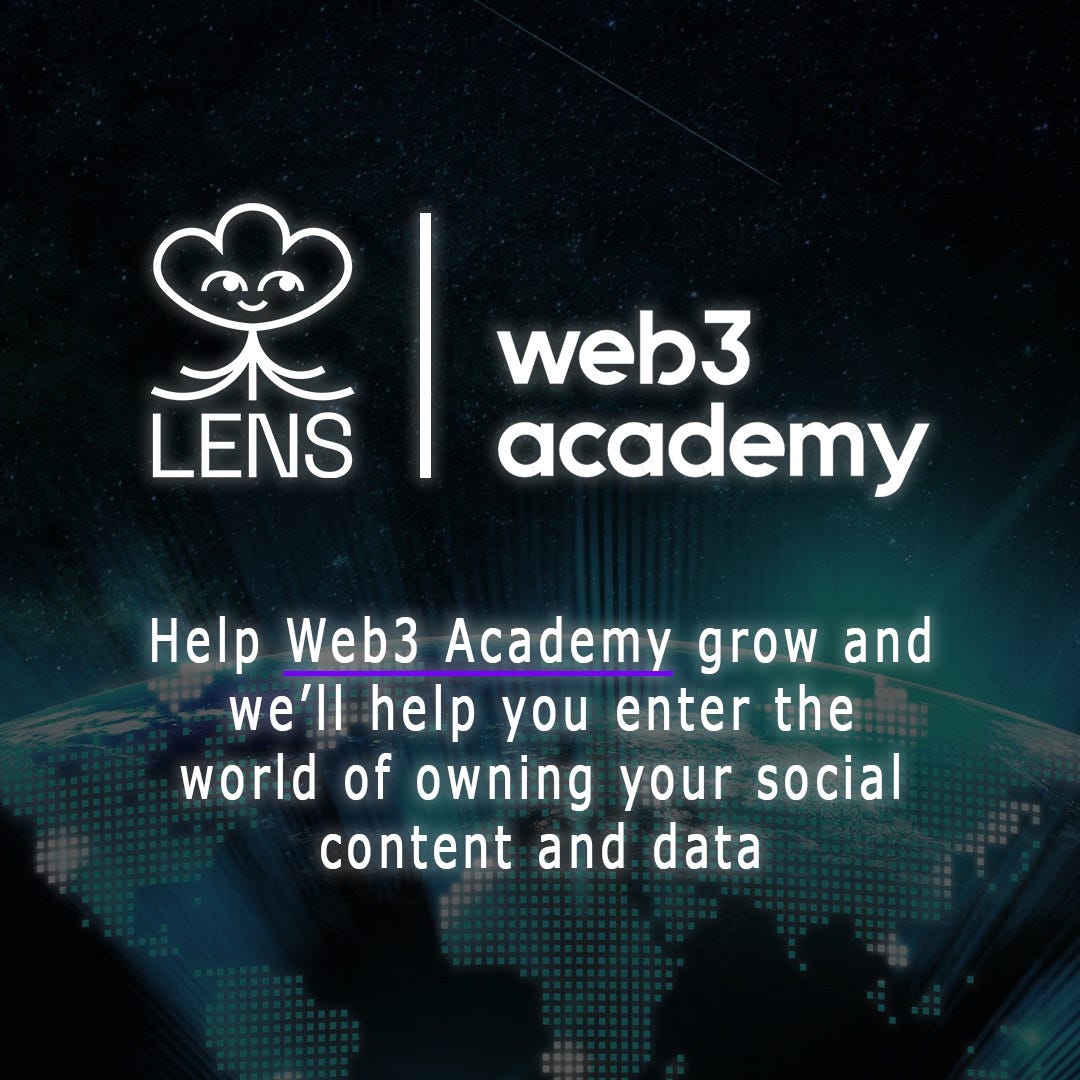One DAO to Rule Them All. Metagovernance + Tips to Scale DAOs | Mel.eth @ Index COOP
Gm Web3 Academy DOers!
Today’s main topic is governance… and something called Metagovernance 👀
Perhaps one of the most important components of Web3.
Since the word is heavily used in politics, you are probably familiar with it. Governance refers to the action or manner of governing a state or organization.
But what does governance have to do with web3 and why is it so important? 🤔
In Web3, specifically within DAOs, decision making can be decentralized. This means that token holders of a certain project can be the ones who make major decisions.
Let’s take Uniswap for instance, which is a DAO that has the $UNI token acting as the governance token of the protocol.
Each $UNI token holder can participate in voting and proposing for stuff within the development of the project.
However, each and everyone’s governance power is dependent on the amount of tokens they hold. The more tokens you have, the greater power you possess.
Naturally, to gain more governance power, individuals / companies will seek to scoop up as many tokens as they can. According to Etherscan, there are almost 100 unique wallets that hold $10M or more in UNI tokens. In other words, around 40% of $UNI tokens are sitting in 100 or so wallets. (Here, I’ve excluded the locked tokens and the Uniswap vesting wallets)
The vast majority of these wallets belong to centralized exchanges such as Gemini, Binance or OKEx but also to other DAOs, such as Index Coop. And this is common to see in DeFi protocols.
What this does is that it gives power to other entities to steer or influence a project. And when there’s a DAO that holds this power, it means that the community of DAO A (the one that holds the tokens) can steer or influence DAO B by voting or making proposals.
This is called metagovernance. And it’s a fascinating and important topic to approach.
To discuss the ins and outs of metagovernance, we’ve sat down with Mel who formerly worked at Index Coop (the company that holds some of the most significant governance power in Web3).
I know this introduction might confuse you, but I’ll try to make it all clear. Just bear with me! 👇
Wait 🚥 Not into reading? 📖
Sit back and watch on Youtube 👀 or listen on Spotify or Apple Podcasts 🎧
❗Lens Protocol Whitelist Update❗
We just went viral... Our Lens Protocol Whitelist 'giveaway' has reached over 100k people (and bots...)
But... we only want to whitelist DOers for Lens Protocol, so we're adding another step to remove the bots! 🚀
To get your whitelist:
Follow Web3 Academy on YouTube, Spotify & Apple Podcasts 🎧
Drop the proof (screenshots) under our pinned Tweet
Tune in to our Weekly Web3 News Rollup on Friday (Sept 9) on Youtube or your favourite podcast platform and listen in for Kyle's Instructions on the final step to claim your Lens Protocol handle.
P.S - After following us on YouTube, Spotify & Apple Podcasts, make sure to turn on the notifications so you don't miss Friday's podcast!
Back to metagovernance... 👇
What is Index Coop?
I’ve hinted at the fact that Index Coop holds some of the most significant governance power in Web3.
What does that mean and how did they get there?
Index Coop is the company behind some of the most significant token indexes in Web3 like the DeFi Pulse Index (DPI) or the Metaverse Index (MVI).
The way indexes work is by compiling a diverse set of tokens, setting a trading or rebalancing schedule and then launching a separate token which takes ownership of the diverse portfolio of tokens.
The benefit to this is a user can simply purchase the token DPI for example and this gives them broad exposure across the best projects in DeFi. The user also doesn’t need to worry about rebalancing or paying fees for trades, the index does all of this for you.
As a result, Index Coop has been able to accumulate a large amount of tokens across DeFi and other sectors. Mel mentioned that they hold well over $100m in different tokens.
The catch here is that the voting power of these tokens does not go to the users holding the index token, instead it remains within the power of Index Coop.
P.S - We're going to mention DAOs quite a few times. If you're not familiar with them, get acquainted with DAOs with one of our previous articles 👉What is a DAO and How Do They Work?👈
The more interesting part is that Index Coop are a DAO themselves, operating under the INDX governance token. INDX holders are able to vote on the votes made for the underlying assets they hold like UNI, AAVE, etc.
This means that there’s a DAO out there that’s able to “rule” over other DAOs. Let’s get into how that’s possible… 👇
🎉 Tweet Of The Week 🎉
What is Governance within a DAO?
As I’ve mentioned in the introduction, your governance power can be subject to the amount of tokens that you hold (this depends on the governance set up of the DAO, many are beginning to experiment away from this model)..
While every token holder can participate in voting and creating proposals, it’s much easier for the big money holders to push the proposals forward. These proposals are essentially what steer a project in one direction or another.
For context, let’s imagine that you want to put forward a proposal for Uniswap…
You have the right to present it, but you need 25,000 votes (1 vote = 1 UNI) in order for your proposal to go through the first stage. If you don’t have the money yourself, you need to convince others to vote on your proposal with their UNI tokens!
PS. At the time of writing, 1UNI ~ $6
If you’ve managed to convince enough people to vote, you go into the second stage where you can explain the proposal in more detail. However, you now need 50,000 votes for your proposal to be valid.
Finally, for your proposal to be actioned upon, you need 2,500,000 votes (aka 2.5M UNI ~ $15,000,000).
As you can tell, the average holder of the governance token has an extremely slim chance of putting a proposal forward. However, Index Coop has that kind of power. And not only inside Uniswap but within a lot of other DeFi protocols.
This means that the Index Coop’s community (DAO) can rule over other DAOs.
That power is called ‘metagovernance’. Is it good or bad? 🤔
The Good and Bad About Metagovernance
Being in possession of so much power, like Index Coop is, could get dangerous. According to Etherscan, DeFi Pulse Index holds 0.15% of the Uniswap tokens (worth $10M) and 0.42% of the Aave tokens. (worth $6M)
You can’t help but think: What if they become as big as Blackrock (The largest investment management firm in the world with over $6 Trillion in assets under management) and they start to rule over and bully a bunch of DAOs?
Blackrock is known for using its power to sway regulation, companies' business models’ and even the direction of entire industries!
And isn’t that what we’re trying to avoid in web3? To stay away from centralization and give everybody a fair voice…
Thankfully, the way Web3 is designed, it does give power to the people. If one entity (like Index Coop) was ever to become too big within a DAO and cause issues and concerns, the holders can come together and vote them out seamlessly and quickly.
So, metagovernance can be bad if it becomes too influential over a project but the good thing is that the participants within the ecosystem can unite and take back ownership.
This might not be as easy as you think though… As mentioned, a lot of the circulating tokens from your typical DeFi account sits in the hands of 100 or so individuals / entities.
This means that you, as a community, need to convince the key token holders to vote in your favor and that might be a tricky thing to achieve, unless you do it in the early stages, before it’s too late and one party has gained too much power.
Now, let’s shift the focus towards DAOs themselves and learn how we can make them grow and achieve their true potential.
This comes from some great advice shared by Mel on the podcast (which you can listen to on YouTube Spotify or Apple Podcasts 🎧)
What Should be the Focus Points in a DAO so That They Achieve Their Ultimate Potential?
We’ve all heard about the use cases and potential of DAOs… But how can we actually make sure that the potential is unlocked?
We’ve asked Mel this question and he’s come up with 6 components that should be considered when building a DAO:
Define a solid mission
Decide clear rules for working together
Practice clear communication
Have empathy for each other
Create a sense of community
Build trust
These 6 components are super important to hold together a DAO of multiple people (sometimes hundreds or even thousands) working together.
In tough situations, having a clear framework that everybody can turn to is vital, otherwise it will all fall apart inevitably.
If the mission is solid and there’s empathy, communication and a sense of community within a DAO, then it can thrive and work together.
Establishing these steps in the beginning of the journey is going to prove decisive.
😂 Meme Of The Week 😂
What do we Need to Take DAOs to the Next Level?
DAOs, like everything else in Web3 are super early. They lack a foundation.
In the real world, you can build a business based on the learnings of other people, because there are millions of businesses out there that have been both successful and unsuccessful. You can learn from them. There’s a foundation.
However, there’s no how-to for best practices in building a successful DAO. Sure, you have the 6 ideas mentioned above but that’s not enough. We need to learn more.
Right now, our main focus should be on building this foundation, a mental model for DAOs if you will.
We need theories, laws, models, behavior patterns and even dictionaries in order to understand each other.
Until we’ve got all of this, we are sailing blindly through uncharted waters and it will get ugly for most of us.
But some will survive and thrive. And the most important thing will be to learn from both sides and make better decisions moving forward.
It’s a long but exciting journey. Thanks for reading, frens. ✌️
Connect with Mel on Twitter
🚀 Action Steps For Web3 DOers 🚀
👉 Tune in on Friday's Weekly Rollup to find out how to get yourself a Lens Protocol whitelist. Follow Web3 Academy on YouTube, Spotify & Apple Podcasts and make sure notifications are on 🛎️
👉 If you'd like to know more about DAOs, refer to our 'What is a DAO and How Do They Work?' article
👉 If you're more into DAO Tokenomics, we've got you covered too.









